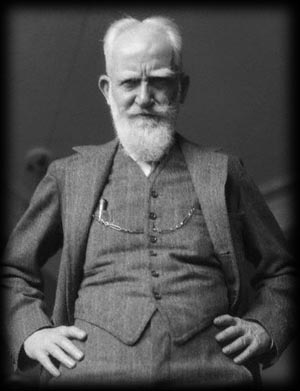
- 1856: Born in Ireland to Protestant family in Dublin
- 1876: Moved to London to join mother, who had abandoned
father, and lived with her until he married at age 42
- 1882: Became a Socialist
- 1891: Published The Quintessence of Ibsenism
- 1898: Married Irish heiress, Charlotte Payne-Townshend; Mrs. Warren's Profession (part of Plays Unpleasant) and Candida (Plays Pleasant); the censor refused to allow Mrs. Warrens' Profession to be produced
- 1902: Mrs. Warrens'
Profession finally produced
- 1905: Major Barbara;
Mrs. Warren's Profession
banned in New York City, and its manager arrested (Innes 226)
- 1913: Pygmalion
- 1923: Saint Joan
- 1925: Received Nobel Prize for Literature; Mrs. Warren's Profession finally licensed for performance; in Letter to the Nation, Shaw writes that the reason the play is probably censored is because it treats topic of possible incest (Innes 230)
- 1931: Visited USSR and met Stalin
- 1939: Academy Award for Best Screenplay for Pygmalion
- 1950: died